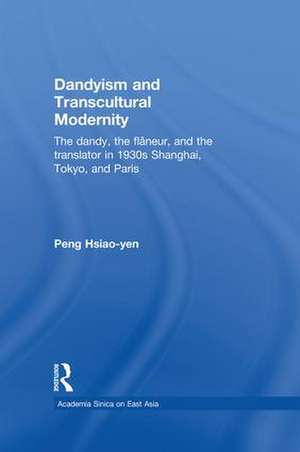Dandyism and Transcultural Modernity: The Dandy, the Flaneur, and the Translator in 1930s Shanghai, Tokyo, and Paris: Academia Sinica on East Asia
Autor Hsiao-yen Pengen Limba Engleză Paperback – iul 2015
Preț: 307.41 lei
Nou
Puncte Express: 461
Preț estimativ în valută:
58.82€ • 61.42$ • 48.57£
58.82€ • 61.42$ • 48.57£
Carte tipărită la comandă
Livrare economică 15-29 aprilie
Preluare comenzi: 021 569.72.76
Specificații
ISBN-13: 9781138879072
ISBN-10: 113887907X
Pagini: 282
Ilustrații: 23 black & white illustrations, 15 black & white halftones, 8 black & white line drawings
Dimensiuni: 156 x 234 mm
Greutate: 0.4 kg
Ediția:1
Editura: Taylor & Francis
Colecția Routledge
Seria Academia Sinica on East Asia
Locul publicării:Oxford, United Kingdom
ISBN-10: 113887907X
Pagini: 282
Ilustrații: 23 black & white illustrations, 15 black & white halftones, 8 black & white line drawings
Dimensiuni: 156 x 234 mm
Greutate: 0.4 kg
Ediția:1
Editura: Taylor & Francis
Colecția Routledge
Seria Academia Sinica on East Asia
Locul publicării:Oxford, United Kingdom
Public țintă
Postgraduate and UndergraduateCuprins
Introduction: Dandyism, the Quintessence of Transcultural Modernity 1. A Dandy, Traveler, and Woman Watcher: Liu Na’ou from Taiwan 2. A Traveling Subgenre: The Palm-of-the-Hand Story 3. The Flâneur and the Flâneuse: Yokomitsu Riichi’s Shanghai 4. A Traveling Text: Souvenirs entomologiques 5. A Traveling Disease: The "Malady of the Heart" and the Modern Boy Conclusion: To Connect
Notă biografică
Peng Hsiao-yen is a research fellow at Institute of Chinese Literature and Philosophy, Academia Sinica. She has published Antithesis Overcome: Shen Congwen’s Avant-gardism and Primitivism and, in Chinese, Beyond realism and Desire in Shanghai: From Zhang Ziping to Liu Na’ou.
Descriere
This book views the Neo-Sensation mode of writing as a traveling genre, or style, that originated in France, moved on to Japan, and then to China. The author contends that modernity is possible only on "the transcultural site"—transcultural in the sense of breaking the divide between past and present, elite and popular, national and regional, male and female, literary and non-literary, inside and outside.











